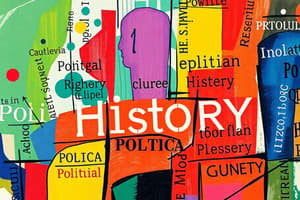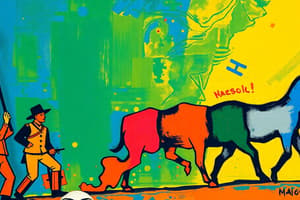Podcast
Questions and Answers
What does the term 'Electorate' refer to?
What does the term 'Electorate' refer to?
- A political party's supporters.
- The ability of a body of people to vote. (correct)
- The administrative service of a government.
- An organization of like-minded individuals.
What does 'Partisanship' mean?
What does 'Partisanship' mean?
- An electoral system.
- A method of voting.
- Belonging to a party or faction. (correct)
- A political debate.
What are 'Spoils and Patronage'?
What are 'Spoils and Patronage'?
- A way to reward supporters with government jobs. (correct)
- A system of checks and balances.
- A type of legislation.
- Funds allocated for public welfare.
What are factions?
What are factions?
What is Civil Service?
What is Civil Service?
Who were the Mugwumps?
Who were the Mugwumps?
What did Reverend Dr. Samuel Burchard say about the Mugwumps?
What did Reverend Dr. Samuel Burchard say about the Mugwumps?
What are Protective Tariffs?
What are Protective Tariffs?
Who were the Grangers?
Who were the Grangers?
What is the 'Commerce Clause'?
What is the 'Commerce Clause'?
Who were the Half-Breeds?
Who were the Half-Breeds?
Who were the Stalwarts?
Who were the Stalwarts?
Who was Roscoe Conkling?
Who was Roscoe Conkling?
Who was James G. Blaine?
Who was James G. Blaine?
Who was Rutherford B. Hayes?
Who was Rutherford B. Hayes?
What happened to James A. Garfield?
What happened to James A. Garfield?
Who was Chester A. Arthur?
Who was Chester A. Arthur?
Who was General Winfield Scott Hancock?
Who was General Winfield Scott Hancock?
Who was Carl Schurz?
Who was Carl Schurz?
What was the role of George William Curtis & Thomas Nast in Harper's Weekly?
What was the role of George William Curtis & Thomas Nast in Harper's Weekly?
Who was E. L. Godkin?
Who was E. L. Godkin?
What was Grover Cleveland known for?
What was Grover Cleveland known for?
Who was Benjamin Harrison?
Who was Benjamin Harrison?
What was the Civil War Pension System?
What was the Civil War Pension System?
What was significant about the Election of 1880?
What was significant about the Election of 1880?
What led to Garfield's Assassination in 1881?
What led to Garfield's Assassination in 1881?
What did the Pendleton Act of 1883 require?
What did the Pendleton Act of 1883 require?
Which two candidates were in the Election of 1884?
Which two candidates were in the Election of 1884?
Flashcards are hidden until you start studying
Study Notes
Key Terms and Definitions
- Electorate: Refers to the body of people eligible to vote in elections.
- Partisanship: Indicates strong allegiance to a political party or faction.
- Spoils and Patronage: Political practice where parties provide government jobs to supporters post-election to secure loyalty.
- Factions: Groups within a government pursuing self-interest, often leading to contention.
- Civil Service: Refers to government administrative positions excluding military roles.
- Mugwumps: A faction of discontented "liberal Republicans."
- "Rum, Romanism, and Rebellion": Phrase coined by Reverend Dr. Samuel Burchard, used derogatorily against Mugwumps during a Republican meeting.
- Protective Tariffs: Tariffs on imports designed to shield domestic industries rather than generate revenue.
- Grangers: Individuals promoting the education of farmers on advanced agricultural practices.
- Commerce Clause: Constitutional provision granting Congress exclusive authority over interstate and foreign trade.
Political Factions and Leaders
- Half-Breeds: Republican faction advocating for civil service reform and merit-based hiring.
- Stalwarts: Republican faction supporting political machines and the spoils system.
- Roscoe Conkling: Leader of the New York Stalwarts known for political patronage.
- James G. Blaine: Leader of the Half-Breeds from Maine, prominent in reform.
- Rutherford B. Hayes: President (1877-1881) who attempted to mediate between Stalwarts and Half-Breeds but exacerbated tensions.
- James A. Garfield: Half-Breed presidential nominee, shot in 1881 shortly after taking office.
- Chester A. Arthur: Stalwart vice-presidential nominee, friend of Conkling, implicated in Garfield's assassination scenario.
- General Winfield Scott Hancock: Democratic presidential nominee and Civil War commander.
- Carl Schurz: Senator from Missouri and Union Army General advocating for reform.
Publications and Political Mayhem
- George William Curtis & Thomas Nast - Harper's Weekly: Political magazine featuring influential editorials and cartography by Nast.
- E.L. Godkin - The Nation: Established by liberal journalist Godkin, focusing on social issues.
- Grover Cleveland: Known as the "veto governor" for his rigorous use of veto power while serving as governor.
- Benjamin Harrison: Republican presidential nominee considered a modest yet respectable candidate.
Notable Systems and Events
- Civil War Pension System: Government program providing annual pensions to Union veterans.
- Election of 1880: Contest between Garfield and Hancock, resulting in Garfield's victory due to a compromise between factions.
- Garfield's Assassination (1881): Garfield shot by a man hoping to elevate Arthur, reflecting factional tensions.
- Pendleton Act (1883): Established competitive examinations for federal job appointments, countering patronage practices.
- Election of 1884: Featured James G. Blaine (Republican) against Grover Cleveland (Democrat); marked by contentious issues.
Studying That Suits You
Use AI to generate personalized quizzes and flashcards to suit your learning preferences.




